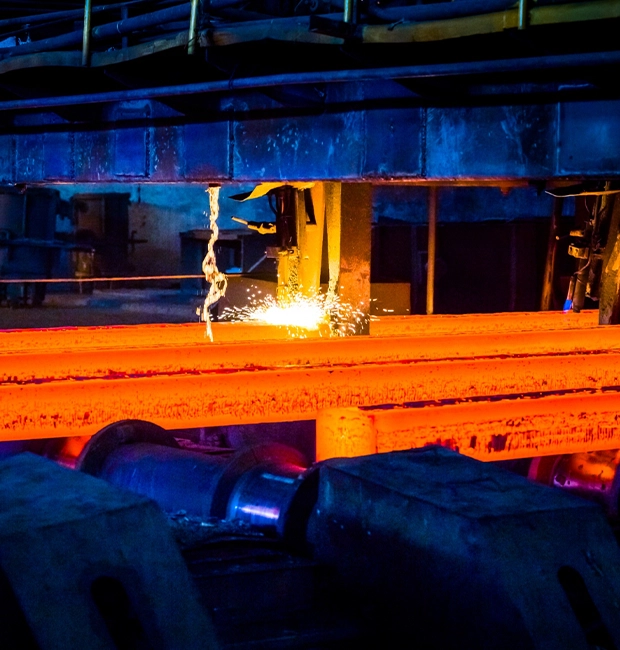
Hot rolling mills are the backbone of the steel industry, transforming raw metal into sheets, plates, and structural shapes that build our world. From tall buildings to bridges, hot rolling mill products are everywhere. However, creating these materials demands precision, efficiency, and reliability — qualities that modern automation systems, like those from Fuji Gemco, consistently deliver. As a joint venture between Fuji Electric, Japan, and Gemco Controls, India, Fuji Gemco is the leader in automation solutions. It offers the latest AC drives, DC drives, PLC systems, and control panels specifically tailored for hot rolling mills. This article explores how advanced automation revolutionizes hot rolling mills, enhances productivity and shapes the future of steel production.
Hot rolling mills process metal at high temperatures-typically above 1,700°F (926°C)—to shape it into usable forms. The process starts with heating large metal slabs, blooms, or billets in a furnace. These are then passed through rollers that reduce thickness, refine shape, and improve mechanical properties. The result? Precision-engineered steel sheets, coils, and bars that serve as integral components in construction, automotive, and infrastructure applications.
Why is automation critical here? Hot rolling is complex, with variables like temperature, pressure, and speed requiring constant control. Manual processes can’t keep up with consistency and efficiency. That’s where Fuji Gemco’s automation solutions excel—ensuring mills operate smoothly, safely, and profitably.

Hot rolling mills offer distinct advantages over other metal-forming processes. Here are five key benefits:
High temperatures make the metal more malleable, allowing precise shaping without cracking.
Mills can produce a wide range of shapes, from thin sheets to heavy structural beams.
Automated systems enable continuous operation, maximizing output.
Large-scale production reduces per-unit costs, making it ideal for bulk production.
Hot rolling creates smooth surfaces, reducing additional processing.
Automation is at the heart of modern hot-rolling mills. It replaces guesswork with precision, reduces downtime, and provides consistent quality. Fuji Gemco’s solutions—AC drives, DC drives, PLC automation systems, and control panels—work seamlessly to optimize every stage of the process. By controlling roller speed and monitoring temperature, these systems create streamlined operation that delivers high-quality steel products.
Automation doesn’t only stand as a luxury; it’s a necessity. Here are a few reasons automation transforms hot rolling mills:
Fuji Gemco brings decades of expertise to hot rolling mills, combining Fuji Electric’s global innovation with Gemco Controls deep understanding of the Indian market. Our solutions are designed to tackle hot-rolling challenges, from maintaining consistent tension to optimizing energy use.
Core Technologies from Fuji Gemco
Fuji Gemco’s product lineup is designed to meet hot rolling mill demands. Here are some core technologies they offer:
Fuji Gemco’s systems are beyond basic automation. We incorporate advanced features to address specific challenges in hot rolling mills. Here are nine technologies that Fuji Gemco offers, making us the preferred choice for our customers.
Hot rolling mills face several challenges, from maintaining product quality to managing high energy costs. Automation addresses these issues head-on, delivering measurable improvements.
Here are a few challenges hot rolling mills undergo:
Fuji Gemco’s automation systems tackle these challenges effectively. Here are some solutions they provide.
Fuji Gemco has a proven track record of transforming hot rolling mills. Their solutions have been deployed on major projects worldwide, delivering tangible results.
Here are three of Fuji Gemco’s recent collaborations in hot rolling mills:
Fuji Gemco is a trusted partner for hot rolling mills, combining global expertise with local insights. Our solutions are reliable, scalable, and customized to clients’ needs. Whether you’re upgrading an existing mill or setting up a new one, Fuji Gemco delivers automation that drives results.
Hot rolling mill automation refers to the use of advanced control systems, AC/DC drives, and PLC-SCADA to manage metal deformation at high temperatures for improved productivity and consistency.
Both AC and DC drives are used. Fuji Gemco provides high-performance drives to handle demanding rolling processes with precise speed and torque control.
Fuji Gemco offers end-to-end automation including drive control, synchronization of mill stands, and process monitoring that reduces downtime and increases throughput.
Yes. By ensuring accurate thickness control and speed synchronization, automation significantly minimizes material wastage.
They allow real-time monitoring, process control, and fault detection, ensuring uninterrupted production and consistent quality.
Automation ensures uniform temperature, rolling pressure, and speed – critical for achieving desired mechanical properties and surface finish.
Yes. With 45+ years of expertise and a JV with Fuji Electric, Fuji Gemco is a trusted name in hot rolling mill automation in India.
Yes. Fuji Gemco specializes in retrofitting old mills with modern automation systems for enhanced performance.
Automation addresses issues like inconsistent product quality, manual errors, low productivity, and high operational costs.